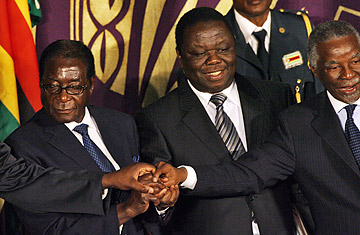
Zimbabwean MDC (Movement for Democratic Change) breakaway faction leader Arthur Mutambara, Zimbabwe's President Robert Mugabe, opposition's leader Morgan Tsvangirai and South African Thabo Mbeki pose after signing the power-sharing accord on September 15, 2008 in Harare.
The shotgun marriage between Zimbabwe's government and opposition was never going to be easy, but it could falter at the first hurdle. Despite signing a power-sharing agreement on Monday, President Robert Mugabe and his arch-rival and new Prime Minister Morgan Tsvangirai have failed to agree on who will control which portfolios in a new cabinet. A meeting between the two men on Thursday aimed at resolving the issue broke up without agreement, as reports began to trickle in of violence breaking out in different parts of the country between supporters of Mugabe's Zanu-PF and the opposition MDC. While most of the violence of recent months has been directed against opposition supporters — thugs controlled by Zanu-PF killed, tortured and displaced thousands to intimidate them into staying away from the polls — on Thursday it was the government crying foul. Reports from the countryside tell of local MDC supporters who lost relatives in the post-election violence seeking vengeance. "It is unfortunate that these violent acts are occurring at a time when we are beginning a new era in the country and such behavior does not make the cooperation between the parties succeed," Justice Minister and Mugabe loyalist Patrick Chinamasa told the state-owned Herald newspaper.
Many Zimbabweans see such accusations as a ploy by Mugabe's government to thwart the deal that will curtail their power. MDC spokesman Nelson Chamisa dismissed as "nonsense" accusations that the party is responsible for violence. Even more ominous, though, was the tone adopted by Mugabe on state television on Wednesday, when he lamented that "If we had not blundered in this election, we would not be facing all this humiliation." The bitterness of their president's words will have burned in the ears of army generals and ZANU-PF hardliners who have vowed never to accept MDC rule. The power-sharing agreement signed on Monday gives the MDC, which won the parliamentary elections in March, a razor thin majority in the cabinet that will run Zimbabwe's government. Mugabe, however, assured his backers that ZANU-PF remains "in the driving seat" and "will not tolerate any nonsense from its partners" — words more likely to incite his generals than to promote reconciliation.
With Mugabe and Tsvangirai now locked in a stalemate over control of key portfolios such as finance, security and information, the power-sharing deal appears to have failed in its first test of goodwill. Analysts say the agreement was vague on who would actually have the upper hand in running the government, and Mugabe and his generals have left no doubt that they intend to retain control of the real levers of power. "I think the game plan is to assume that the MDC has been softened up enough [by the past months of violence]] to ensure that they don't really stray into the areas that the generals don't want them to stray into," Steven Friedman, director of the Center for the Study of Democracy in Johannesburg, told TIME.
In the 1980s, Mugabe successfully neutered the challenge of his liberation-era rival Joshua Nkomo, by bludgeoning his supporters in a sustained campaign of violence and then drawing a cowed Nkomo into a subservient role in government. This time, however, Mugabe's end-game may be about securing a safe exit for himself. A top government intelligence officer told TIME that Mugabe, despite his angry rhetoric, may in fact be preparing to step down. "One thing for sure is that Mugabe is now on the prowl, especially in his own party," the intelligence officer said. "He wants to deal with those who contributed to his defeat in March and create a safe exit for himself. By coming up with a unity accord, Mugabe wants to exit as a good statesman and give the impression that he was a unifier."
But even if Mugabe does retire soon, his generals are unlikely to relinquish control. "Until the balance of power shifts, and the generals around Mugabe start realizing that they need the opposition, I think one has to be quite pessimistic," Friedman said. And as long as reconciliation remains elusive at the top the followers of Zanu-PF and the MDC are unlikely to embrace one another. "It would be naive to think that the deep-seated rivalry between the two parties will suddenly disappear," Zimbabwean political analyst Eldred Masunungure told TIME. "The MDC supporters think they have finally won over ZANU-PF, which is wrong."
